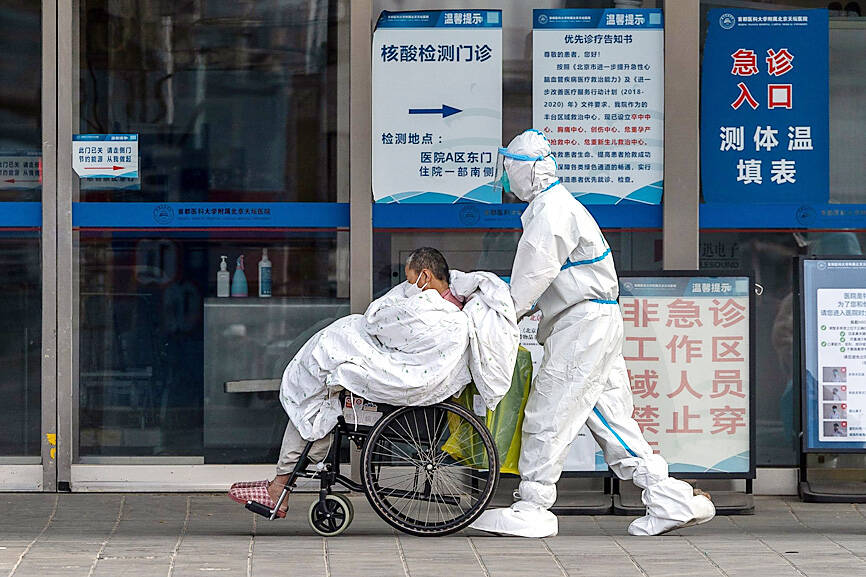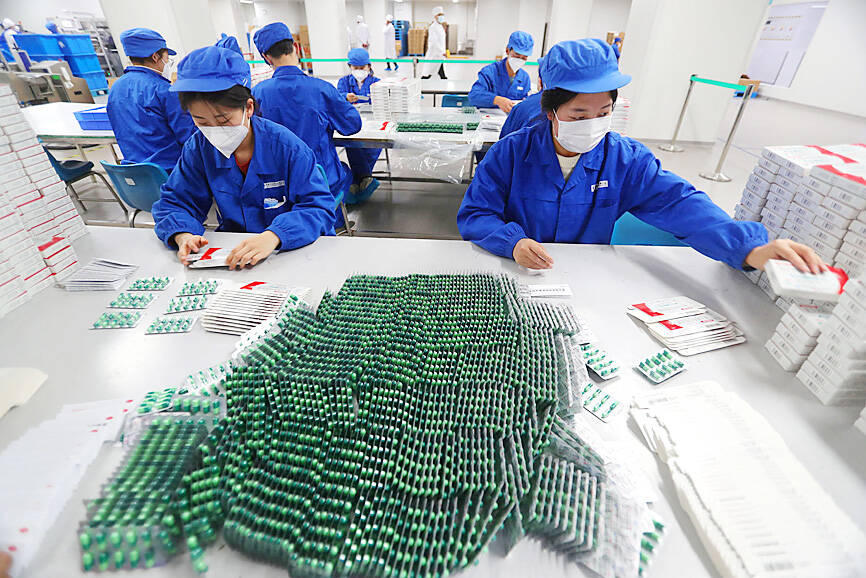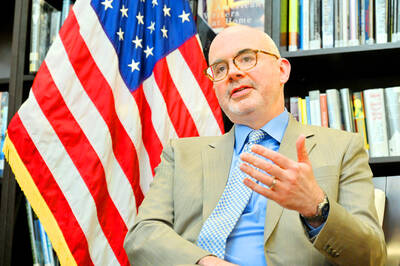China’s COVID-19 cases have become “impossible” to track, the country’s top health body said yesterday, with officials warning that cases are rising rapidly in Beijing after the Chinese government abruptly abandoned its “zero COVID-19” policy.
Beijing’s move to scrap mass testing and quarantines after nearly three years of attempting to stamp out the virus has led to a drop in officially reported infections, which last month hit an all-time high.
However, those numbers no longer reflect reality because testing is no longer required for much of the country, the Chinese National Health Commission said in a statement.

Photo: Bloomberg
“Many asymptomatic people are no longer participating in nucleic acid testing, so it is impossible to accurately grasp the actual number of asymptomatic infected people,” the commission said.
The statement came after Chinese Vice Premier Sun Chunlan (孫春蘭) said new infections in the capital were “rapidly growing.”
Chinese leaders are determined to press ahead even though the country is facing a surge in cases that experts fear it is ill-equipped to manage. Millions of vulnerable older people are still not fully vaccinated against COVID-19, and underfunded hospitals lack the resources to deal with an influx of infected patients.

Photo: REUTERS
Authorities said they would begin allowing vulnerable people, including those aged 60 or older, to receive a second COVID-19 vaccine booster six months after their first.
A line of about 50 people stretched out the door of a fever clinic in Beijing yesterday, with multiple residents saying they were infected with COVID-19.
“Basically, if we are lining up here, we are all infected. We would not come here if we weren’t,” one person waiting in line said. “I’m here with a senior member of my family, he’s had a fever for nearly 10 days in a row now, so we are coming to do a checkup on him.”
Restaurants, shops and parks are allowed to reopen, but residents are not finding the path to living with the virus straightforward.
Many symptomatic cases have opted to self-medicate at home, while others are staying in to protect themselves from getting infected.
Businesses are also struggling as COVID-19 rips through the population and hits their staffing. As a result, the capital’s streets are largely empty.
“Basically I follow the requirements of the Beijing government, that the elderly should stay home and go out as little as possible,” said one resident in his 80s who declined to give his name.
He said he was not too worried because he thought that the Omicron variant of SARS-CoV-2 was mild, but added that “there shouldn’t be complete relaxation and freedom.”
“If we are dead, how can we be free, right?” he said.
People have complained of sold-out cold medicines and long lines at pharmacies, while Baidu Inc (百度) said that Internet searches for fever-reducing ibuprofen had risen 430 percent over the past week.
Soaring demand for at-home COVID-19 tests and medications has created a black market with astronomical prices, while buyers resort to sourcing the goods from “dealers” whose contacts are being passed around WeChat groups.
Authorities are cracking down, with market regulators hitting one business in Beijing with a 300,000 yuan (US$43,166) fine for selling overpriced test kits, the Beijing News reported on Tuesday.
In a sea change for a country where COVID-19 infection was once taboo and recovered patients faced discrimination, people are now taking to social media to show off their test results and give detailed descriptions of their experiences while infected.
A Beijing resident in his 50s said: “I think everyone has got used to it. They have moved on... I don’t think people are that fragile.”

SEPARATE: The MAC rebutted Beijing’s claim that Taiwan is China’s province, asserting that UN Resolution 2758 neither mentions Taiwan nor grants the PRC authority over it The “status quo” of democratic Taiwan and autocratic China not belonging to each other has long been recognized by the international community, the Mainland Affairs Council (MAC) said yesterday in its rebuttal of Beijing’s claim that Taiwan can only be represented in the UN as “Taiwan, Province of China.” Chinese Minister of Foreign Affairs Wang Yi (王毅) yesterday at a news conference of the third session at the 14th National People’s Congress said that Taiwan can only be referred to as “Taiwan, Province of China” at the UN. Taiwan is an inseparable part of Chinese territory, which is not only history but

CROSSED A LINE: While entertainers working in China have made pro-China statements before, this time it seriously affected the nation’s security and interests, a source said The Mainland Affairs Council (MAC) late on Saturday night condemned the comments of Taiwanese entertainers who reposted Chinese statements denigrating Taiwan’s sovereignty. The nation’s cross-strait affairs authority issued the statement after several Taiwanese entertainers, including Patty Hou (侯佩岑), Ouyang Nana (歐陽娜娜) and Michelle Chen (陳妍希), on Friday and Saturday shared on their respective Sina Weibo (微博) accounts a post by state broadcaster China Central Television. The post showed an image of a map of Taiwan along with the five stars of the Chinese flag, and the message: “Taiwan is never a country. It never was and never will be.” The post followed remarks

INVESTMENT WATCH: The US activity would not affect the firm’s investment in Taiwan, where 11 production lines would likely be completed this year, C.C. Wei said Investments by Taiwan Semiconductor Manufacturing Co (TSMC, 台積電) in the US should not be a cause for concern, but rather seen as the moment that the company and Taiwan stepped into the global spotlight, President William Lai (賴清德) told a news conference at the Presidential Office in Taipei yesterday alongside TSMC chairman and chief executive officer C.C. Wei (魏哲家). Wei and US President Donald Trump in Washington on Monday announced plans to invest US$100 billion in the US to build three advanced foundries, two packaging plants, and a research and development center, after Trump threatened to slap tariffs on chips made

CONSISTENT COMMITMENT: The American Institute in Taiwan director said that the US would expand investment and trade relationships to make both nations more prosperous The US would not abandon its commitment to Taiwan, and would make Taiwan safer, stronger and more prosperous, American Institute in Taiwan Director Raymond Greene said. “The US’ commitment to Taiwan has been consistent over many administrations and over many years, and we will not abandon our commitment to Taiwan, including our opposition to any attempt to use force or coercion to change Taiwan’s status,” he said in an exclusive interview with the Liberty Times (the sister newspaper of the Taipei Times) on Friday last week, which was published in the Chinese-language newspaper yesterday. The US would double down on its efforts